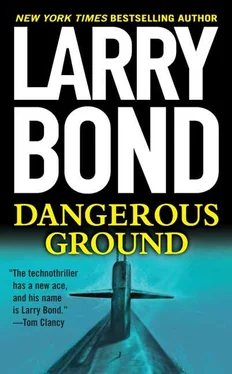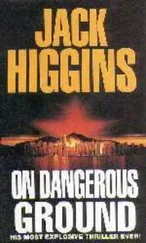“On the sonar?” Hardy questioned.
“This is a high-resolution sonar, sir. It’s designed to see obstructions like cables or wires.”
“Mr. Mitchell, have you reached the Grishas yet?”
“No sir, I estimate ten to fifteen minutes more before I can place the decoy.”
“All right, Doctor Davis,” Hardy conceded. “Go see what it is.” His tone made it clear that she’d better be quick.
Davis brought the ROV around to the left, angling away from the sub. She didn’t increase speed because of both the low battery charge and the short distance. In about a minute, an object appeared, centered in the video screen.
It rested on the seabed, two sets of short wheels barely visible in the silt. The body was cylindrical, about a foot in diameter and perhaps five or six feet long. It was painted dark green and there was virtually no marine growth. A thick black cable led away from the object to the west, in the direction of the shore. Two other cables with small bumps on them were laid out, parallel to the coastline. A white-painted “2” was visible as she steered Huey in a circle around it.
Jerry was still staring at the video image, trying to fathom its purpose, when Hardy ordered, “Dr. Davis, get your ROV back aboard as quickly as you can. Report the instant we can safely get under way.”
“Yes, sir,” Davis answered. Her expression matched Jerry’s puzzlement.
“Mr. Mitchell, report.”
“The Manta’s course is due south, speed ten. The XO’s computing the drop point for the decoy right now.”
“Do you understand what that object was?”
“No, sir,” he confessed reluctantly. It didn’t pay to admit ignorance to the Captain, but he really didn’t have a clue.
“It’s a fixed acoustic sensor, mister. Someone’s keeping a watch on that barge.”
“Like the Russian Navy?” asked Davis.
“It explains the Bear and the Grishas. We didn’t see any naval activity in this area until we found that damn barge.” Hardy was angry, although Jerry wasn’t quite sure at who.
“Why would you put sensors around something you dumped?” Jerry asked.
“You wouldn’t,” Davis answered. “It wasn’t dumped. It was hidden here.”
“U-Bay, conn,” This time Bair’s voice came on the line. “Steer right to course three five zero. You should release the decoy in two minutes.”
“Steer right to course three five zero, U-bay aye. How far away are the Grishas?”
“Just less than five miles from you. You’ll drop the decoy at the edge of their detection range. They’ll see it, but not the Manta because it’s smaller. After release, change course to due north at ten knots, max depth.”
“Change course to due north at ten knots, max depth, aye,” Jerry answered. “Should I wait for your call to drop?”
“Yes. We’re continuing to track the Grishas passively. If they change course, we may have to alter the decoy’s location.”
Davis came on the line. “Control, I’ve started Huey’s recovery sequence. We should be able to move in a five minutes.”
“Thanks, Doctor,” Bair answered.
“Doc Noonan’s checked the divers,” someone on the circuit reported. “He says they’re okay, but he’s put them both on bed rest with borderline hypothermia and exhaustion.”
“One minute to decoy drop,” Bair announced. “Course is good.”
Jerry double-checked the console. He made sure he was set to release a Mark 4, and not one of the smaller Mark 3s. They might confuse a torpedo’s sonar, but never a medium-frequency search set. The Mark 3’s noise was too high-pitched for them to hear it. He could see two sonar contacts on his passive display. The signal was strong, which meant they were close. Jerry continued to report the bearings to control.
“Huey’s aboard,” Emily announced triumphantly. “Control, we’re secure.”
“Speak for yourself,” Jerry muttered as he felt the deck shift. Hopefully Hardy had left enough room in front to allow Memphis to turn. With their single screw and rudder configuration, Hardy couldn’t back and turn a submarine like a sports car. In fact, it wouldn’t even back and turn like a bus. He wondered how long they had been so close to the sensor — and what its owners would hear. He called out another set of bearings to control.
“Wait for it… Drop!” Bair ordered and Jerry pressed the release. Without waiting, he changed course to due north, keeping his speed at ten knots. He wanted to go faster, but too much noise would attract unwelcome attention. At that speed, it would take half an hour for him to get completely clear of the Russian patrol ships. On the other hand, the Russians would take at least that long to detect, localize, and classify the contact as false. He hoped.
Jerry desperately wanted to be in control, to see the Russian ships’ position as well as his own. He also wanted to go to sickbay and see how the COB and Harris were. And most of all, he really wanted to know what the story was with those missile warheads.
June 11, 2005—1800
Northern Fleet Headquarters
Severomorsk, Russia
Admiral Yuri Kirichenko strode into the briefing like he owned the place, which, in effect, he did. He was the Commander of the Northern Fleet, which, even after the collapse of Russian naval power, still meant something.
Kirichenko’s legend had grown with his rank. A competent junior officer under the Soviet regime, he’d been promoted just in time to become another impoverished senior officer. He’d remained in the military, ruthlessly fighting corruption and pushing efficiency as a necessary substitute for proper funding. By force of will, he’d kept the Northern Fleet from imploding.
So when he walked into the room with his characteristic high-speed stride, everyone in the room snapped to attention and everything was ready for his arrival, from the briefing materials to the tea and fresh fruit by his seat. Kirichenko was also well known for expecting the perks and privileges of his rank.
“Good evening, Admiral.” Captain First Rank Orlov was the Intelligence Officer on the staff. Normally he had one of his deputies conduct the actual briefing, but this material was too important.
“Since the last brief at 0800, we’ve confirmed that there’s no surface traffic in the area. Two patrol craft have reached the scene and reported detecting a submarine contact within our territorial waters. They attempted to localize it for prosecution, but it disappeared before they could make an attack.
“The seabed sensor grid hasn’t reported any activity since 1715. Total elapsed time of the most recent detection was one hour and thirty-seven minutes. We’ve had experts examining the data but the sensors were never designed for narrowband…”
“I’m aware of the sensor’s capabilities, Captain,” growled Kirichenko.
Orlov nodded quickly “Of course, sir. My apologies. They have determined that the sound signals came from more than one source, and there were a large number of transients during the period.”
The intelligence officer frowned. “Combined with the length of time they were near the array, we conclude they were working at that location and that they were unaware of the array’s presence. They may have been landing agents or planting surveillance equipment…”
“When we catch them, we’ll ask them,” declared the Admiral, standing and walking around to the head of the table. Orlov hurriedly gathered up his notes and returned to his seat. Kirichenko’s entire staff had assembled for this meeting, and they all listened intently.
“Whatever their purpose, they are not here to help the Russian Federation. I’m declaring a fleet-wide alert. I want aircraft covering the Kara Sea from the location of the incident all the way north, to the edge of the polar ice pack. Every operational unit is to get underway and head for the area. Admiral Sergetev,” he pointed to his deputy, “will be in charge of the search.”
Читать дальше












